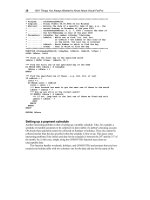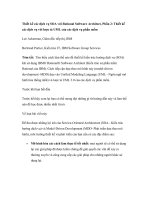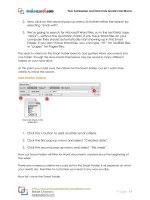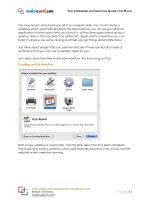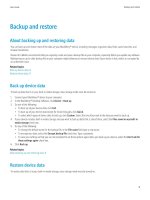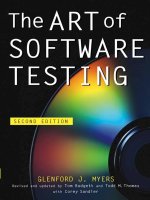Happy About Global Software Test Automation Book Excerpt A Discussion of Software Testing for Executives phần 2 ppt
Bạn đang xem bản rút gọn của tài liệu. Xem và tải ngay bản đầy đủ của tài liệu tại đây (79.62 KB, 10 trang )
6 Chapter 3: The Pitfalls of Manual Software Testing
Case Studies
We surveyed CxO’s and senior managers in a wide range of software
companies, inquiring about their views and war stories related to
manual software testing. Responses and suggestions we received on
this subject appear in the following paragraphs. We are sharing with
you the benefit of learning from their experience.
Clear test planning, coupled with well-defined acceptance tests at
all levels, provide visibility into the management of customer
expectations.
Michael Abbott, CTO and founder of Composite Software, shared with
us the following:
“Software testing in the U.S. has been traditionally not viewed as a
priority for many development organizations. Typically, with
ever-shrinking deadlines and a demand for increased productivity,
many engineering managers cut the time for testing software in
favor of fewer features and/or enhancements. This will change
during this decade, as a larger focus on quality will be demanded
by customers and is already being reflected in many negotiated
software license agreements with Fortune 100 companies.
Companies are discovering that the operational cost for
poorly-tested software is significantly affecting their bottom line.”
“One of the many challenges in software testing is building the test
plan with the appropriate test cases to outline the focus on the
quality evaluation process. Many companies fail to clearly build a
strategy around testing, and thus fail to communicate to the
implementation team in the field what has and has not been tested.
To address this issue, acceptance criteria needs to not only be a
part of a testing plan for the passing of a product from development
to testing, but [is] also [essential] to professional services. As a part
of the internal release notes, the test case coverage needs to be
clearly communicated in order to mitigate product risks with
customers in the field. This approach resulted in an increase in
successful proof of concepts at the customer sites, as well as more
effective management of expectations by internal and external
personnel.”
Happy About Global Software Test Automation 7
Consider speed versus cost in your strategy.
Clive Boulton, Senior Developer of Exact Software, shared the
following with us:
“Experience is a great teacher. Regarding testing ERP software,
including e-Business and accounting… In the past, before global
labor resources [were available], we automated to save money
on-shore, but found manual testing was more essential and flexible
but so costly. We recommend automatic testing on-shore to cut
costs, manual testing off-shore where labor costs are not critical.
The hybrid of both automated and manual testing are required.
Keep in mind, automating testing before a product is version 1.0 is
just not practical.”
Manual testing, while not scalable, is often unavoidable.
Mark Tezak, Acrobat Quality Engineering at Adobe Systems, Inc.,
shared with us the following about the problems and benefits of manual
software testing:
“As the areas I test concern document creation for print production,
there is not a lot of automation I employ at all, save for some very
basic scripting of repetitive tasks. Much of this functionality is built
into the programs, as well for the user, in the form of batch
processing commands. So the expertise I bring to the task is
two-fold, namely workflow production knowledge resulting from
seventeen years of experience of the publishing and printing
industry, combined with the skills I have learned in software quality
engineering. As a result, I am able to not only create real-world
user scenarios and workflows, but also to quickly identify a chain
of defects easily once a vulnerability has been discovered in a
particular area during product development, since I am aware of
the functional interdependencies.”
8 Chapter 3: The Pitfalls of Manual Software Testing
Poor funding and lifecycle management leave little room for
testing improvement.
Shyamsundar Eranky of Symbol shared with us the following:
“I feel that QA is perhaps the most important part of software
development and sadly the most neglected—either due to a time
or resource crunch. On manual software testing, even though this
is not the most reliable form of testing, sometimes it is the only form
of testing available. This was true more so for projects that involved
GUI testing than server side testing. Although software automation
tools exist for such testing, it is often not suited given the time to
complete the QA.”
Driving toward the solution
In the last chapter, we discussed:
• The Pitfalls of Manual Software Testing.
In the following two chapters, we will discuss:
• The Pitfalls of Software Test Automation
• The Pitfalls of Outsourcing/Offshoring Software Testing
In Chapter 6, we will present the Global Test Automation strategy, an
approach that avoids these pitfalls and enables you to capitalize on the
value that software testing can provide.
Summary
Manual software testing is slow and costly, does not scale well as
the complexity of the software increases, and has lack of
repeatability and consistency in results. To improve software
testing, you should automate the testing process as much as you
can, while allocating sufficient resources for manual testing.
Providing the test function with its own budget, as opposed to a
flexible portion of the overall project budget, is very useful here.
Managing the software test process with as much care as the
software development process, from documentation of the test
plans and ranking of the tests to test execution and reporting, will
also be helpful.
Happy About Global Software Test Automation 9
Authors
About the Authors
Hung Q. Nguyen is Founder and CEO of
LogiGear, responsible for the company's
strategic direction and executive management.
He's been a leading innovator in software
testing, global test automation, testing tool
solutions and testing education programs for
over two decades. Nguyen and LogiGear have
helped companies, from Fortune 500 to startups,
delivering unique testing solutions which double
their test coverage, cut test time in half, improve
quality and reduce cost. As one of the top
thought-leaders in the software testing industry,
Nguyen is coauthor of the top-selling book in the
software testing field, Testing Computer
Software (Wiley, 2nd ed. 2002) and other
publications including Testing Applications on
the Web (Wiley, 2nd ed. 2003). Nguyen's
experience includes leadership roles in software
development, quality, and product management
at leading software companies.
10 Authors
Nguyen is also a director of two non-profit
organizations, the Association for Software
Testing, an organization dedicated to improving
the practice of software testing by advancing the
science of testing and its application which he
co-founded, and San Francisco Bay Jazz
Ensemble, an eighteen-piece big band with a
mission to provide live music to local community
as well as through international venues to further
public awareness and appreciation of the
valuable American musical heritage, jazz. He
holds a Bachelor of Science in Quality
Assurance from Cogswell Polytechnical College.
Happy About Global Software Test Automation 11
Michael Hackett co-founded LogiGear in 1994
and leads the company's LogiGear University
training operations division, setting the standard
in software testing education programs for many
of the world's leading software development
organizations. Mr. Hackett is coauthor of the
popular Testing Applications on the Web (Wiley,
2nd ed. 2003), and has helped many clients
produce, test and deploy applications ranging
from business productivity to educational
multimedia across multiple platforms and
multiple language editions. His clients have
included Palm Computing, Oracle, CNET, Roche
Pharmaceuticals, Pfizer and Bank of America.
He is on the Board of Advisors for the Software
Quality Engineering and Management Certificate
Program at University of California at Santa
Cruz. Michael's training has brought Silicon
Valley Quality and Testing Expertise to 10
countries around the world. He holds a Bachelor
of Science in Engineering from Carnegie-Mellon
University.
12 Authors
Brent K. Whitlock is currently with the patent
practice group at Carr & Ferrell LLP where he
helps inventors, entrepreneurs, and executives
develop their intellectual property strategies and
patent portfolios. He is also a founding
shareholder of RSoft Design Group, Inc., where
as Director of Optical Systems Research and
Business Development, he initiated and led the
development and commercialization of several
optical communication system simulation
software packages including LinkSIM™,
ModeSYS™, and OptSim™ 4, which won the
Lightwave OFC/NFOEC 2005 Attendees Choice
Award. He has also secured and served as
Principal Investigator on federally funded SBIR,
STTR, and NIST ATP research contracts.
Dr. Whitlock earned his B.S., M.S., and Ph.D. all
in Electrical Engineering from the University of
Illinois at Urbana-Champaign. Dr. Whitlock has
co-authored over 30 technical papers and
articles. He is a Sr. Member of the IEEE and
Chair of the Santa Clara Valley chapter of IEEE
LEOS.
Happy About Global Software Test Automation 13
About LogiGear®
LogiGear is the leading provider of global
solutions for software testing, focusing on test
automation. Founded in 1994, led by top thought
leaders in the software testing industry, and
supported by a bright, hard-working staff that has
a passion for software testing, and that
all-important eye for detail, LogiGear has provided
effective software quality solutions to clients
ranging from the Fortune 500 to early-stage
startups. LogiGear works closely with its
customers to determine their exact software
quality testing goals and challenges, then designs
unique solutions based on our onshore/offshore
testing services, test automation tools, QA
training, and consulting.
LogiGear partners with its customers to ensure
that they have the right approach for test
automation success. Based on the unique goals
and needs of an organization, LogiGear provides
varying solutions such as a complete Global Test
Automation solution, Action Based Testing™
training, consulting, coaching, TestArchitect
tooling or integration of existing third-party or
homegrown tools into the TestArchitect
framework.
LogiGear is a privately funded corporation
headquartered in Foster City, California.
14 Authors
About TestArchitect™
TestArchitect provides a powerful test automation
framework supporting the Action Based Testing™
method, allowing software development teams to
double their test coverage and decrease testing
time, leading to better product quality and reduced
costs.
TestArchitect is flexible and easy-to-use, and
draws on LogiGear’s many years of experience in
the software quality assurance industry, including
the leadership of the original architect of the
keyword driven testing method. LogiGear offers
turnkey test automation solutions that will benefit
the entire software quality process, from test
design to team management.
Reducing time-to-market and improving product
quality are critical to the success of any software
organization. TestArchitect enables all members
of the team to improve the testing effort. Testers
and business analysts have an easy-to-use
method for creating intelligent, maintainable tests
which can be executed manually or automatically.
Automation engineers have powerful tools based
on industry-standard languages for creating the
underlying test automation. Managers can
maintain control and efficiency of their global
testing efforts through a central repository and
easy-to-use, customizable reports. Business
stakeholders can reduce testing cost through our
proven ROI model.
Happy About Global Software Test Automation 15
A Message From Happy About®
Thank you for your purchase of this Happy About book. It is available online at:
o/globalswtestautomation.php
or at other online and
physical bookstores.
• Please contact us for quantity discounts at
• If you want to be informed by e-mail of upcoming Happy About®
books, please e-mail
• If you want to contribute to upcoming Happy About® books,
please go to o/contribute/
• Please see our web page
o/globalswtestautomation.php
Happy About is interested in you if you are an author that would like to submit
a non-fiction book proposal or a corporation that would like to have a book
written for you. Please contact us by e-mail
or
phone (1-408-257-3000).
Other Happy About books available include:
• Happy About Joint-Venturing:
o/jointventuring.php
• Happy About LinkedIn for Recruiting:
o/linkedin4recruiting.php
• Happy About Website Payments with PayPal:
o/paypal.php
• Happy About Outsourcing:
o/outsourcing.php
• Happy About Knowing What to Expect in 2006:
o/2006economy.php
Other soon-to-be-released Happy About books include:
• Happy About CEO Excellence:
o/ceo-excellence.php
• Happy About Working To Stay Young:
o/working-to-stay-young.php
• Happy About Open Source:
o/opensource.php


